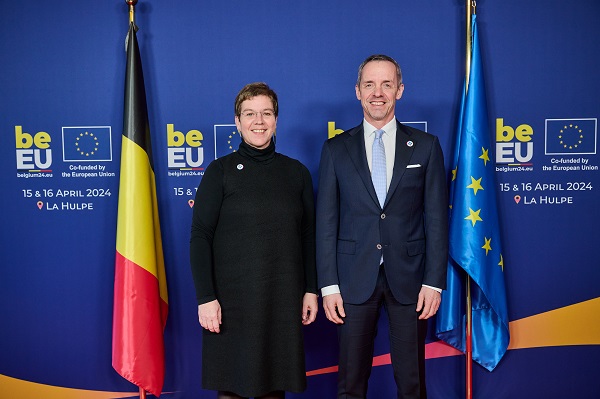 (L-R) Martine Deprez, Luxembourg's Minister of Health and Social Security; Georges Mischo, Luxembourg's Minister of Labour;
Credit: ROS
(L-R) Martine Deprez, Luxembourg's Minister of Health and Social Security; Georges Mischo, Luxembourg's Minister of Labour;
Credit: ROS
Luxembourg's Ministry of Health and Social Security and the Ministry of Labour have reported that their respective government ministers participated in the High-Level Conference on the European Pillar of Social Rights in La Hulpe, Belgium on Monday 15 and Tuesday 16 April 2024.
On this occasion, Luxembourg's Minister of Health and Social Security, Martine Deprez, and the Minister of Labour, Georges Mischo, exchanged views with their European counterparts and representatives of European institutions, social partners and civil society.
Minister Deprez notably participated in a panel dedicated to the theme of "Guaranteeing access to social protection for all in a changing labour market". In her speech, she detailed the measures put in place in Luxembourg to allow very vulnerable people access to healthcare and medical treatments required by their state of health or illness.
More precisely, the minister presented the universal healthcare coverage pilot project, for which the 2023-2028 coalition agreement provides for the creation of a dedicated legal basis in order to make it a permanent measure for the most vulnerable people.
During the session on "Achieving the Porto objectives by 2030: the role of analysis, monitoring and statistical capacity", Minister Deprez highlighted the importance of using quality statistical data, both at national and European level, to better align measures and actions with people's needs.
She also welcomed the fact that "the implementation of the principles of the European Pillar of Social Rights, and in particular the EU's overall quantified objectives, is one of the main common priorities of the European Union in the context of the revised economic governance, which offers excellent potential for continued work, including the establishment of an operational framework for the evaluation of social investments."
Labour Minister Georges Mischo participated in a session on fair working conditions which focused specifically on the consequences of artificial intelligence (AI) and algorithmic management on the world of work. During his speech, he highlighted the positive effects on employment and productivity that can be expected from AI while insisting on the importance of avoiding negative effects on working conditions and workers' rights; he noted that AI should be developed for the benefit of employees and not to their detriment.
Minister Mischo also participated in a panel dedicated to labour market policies for a just transition with a specific focus on the right to lifelong learning, the right to requalification and the improvement of skills. The theme chosen for this panel echoes the first principle of the European Pillar of Social Rights, noted the respective ministries.
During his speech, Minister Mischo presented the bill which aims to invest not only in the requalification and improvement of the skills of jobseekers but also to anticipate future dismissal situations due to potential mismatches between existing skills and those that are required due to the rapid transformations of the new world of work. He added that the provisional employment and skills management programme planned by the project is aimed at companies which are experiencing a transformation of their activities, their professions or their skills needs and which wish to invest, in a preventive manner, in the skills of their existing staff.
On the sidelines of the conference, Luxembourg's Labour Minister had a brief exchange with the Executive Director of the European Labour Authority (ELA), Cosmin Boiangiu, on the future of the ELA and with the Director of the Office of the International Labour Organization (ILO) for the European Union and the Benelux countries, Lieve Verboven, on the state of ratification of certain ILO conventions.
For her part, Minister Deprez had bilateral exchanges with Hubertus Heil, Germany's Federal Minister of Labour and Social Affairs, as well as with Attila Fülöp, Hungary's Minister Delegate for Social Affairs. The ministers took stock of current European issues and Minister Deprez shared her views on the social challenges ahead in view of the next legislative cycle of the European Union.
This high-level conference resulted in the signing of the La Hulpe Declaration on the Future of Social Europe, the purpose of which is the preparation of the future social agenda for the period 2024-2029, which thus continues the implementation of the European Pillar of Social Rights.








